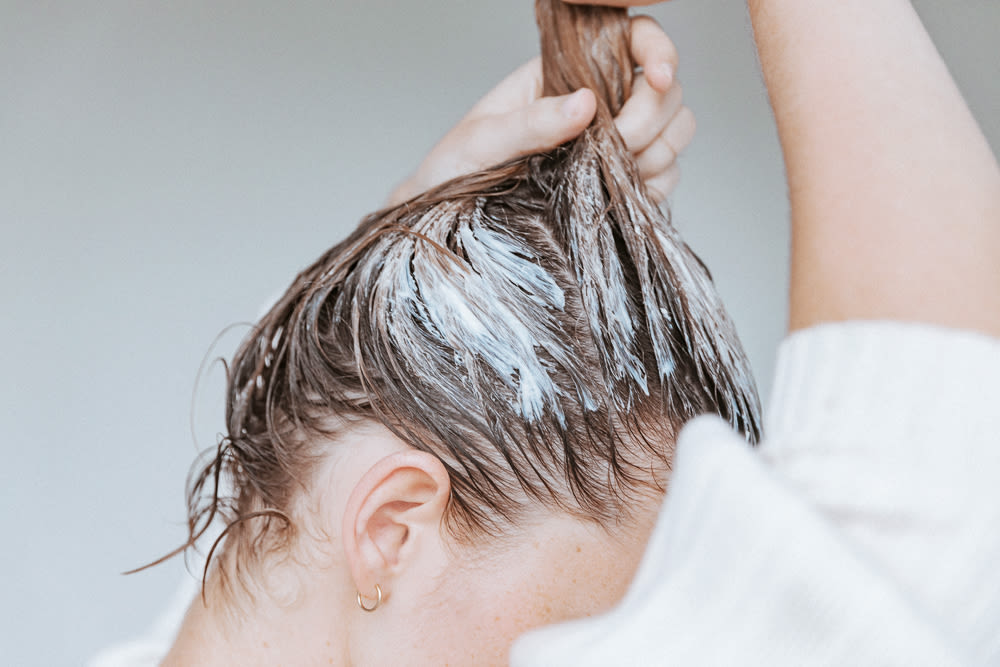Everyone’s seen that photo of President Barack Obama. No, not the one where he’s paddleboarding on vacation. Or the one where he’s smoking in college. I’m talking about the side-by-side comparison of Obama in his first year and the last year being president—he starts out with black hair, and ends a silver fox.
For what it’s worth, Obama swears early grays run in the family. And most of the time, the timeline of your gray hair is written into your genetics. (It's worth asking older family members when they experienced graying.) However, there are lots of other (more controllable) things that contribute to graying, and if you balance them properly, you can help minimize its progression. It all comes down to stress: the more of it you put on your hair and body, whether from internal or external sources, the faster your gray will go. Some examples...
Harsh haircare
Jay Small, an LA-based hairstylist and cofounder of the anti-graying supplement line Arey, explains that washing, styling, and coloring your hair all put stress on it. Small suggests opening a dialogue with your stylist before diving into a new look. If it’s a chemical process, ask how often you’ll need to get it touched up. If it’s a new cut, ask what kind of daily styling you’ll have to do (heat tools? lots of product?) to achieve the look you want.
Small also emphasizes the importance of keeping color off of the scalp, protecting it with foil while processing, and choosing the right developer to minimize a stress reaction. You can also try a gray-blend to minimize your touch-ups. (Think a root shadow or ombre situation, but for your grays.) “Blending is achieved by using just a five to ten volume developer, which limits how much hair color the strand absorbs.”
Exposure to the elements
Just like they can dry out and age your skin, smoking, heavy sun exposure, and polluted city living put stress on your hair and can speed up graying.
Antioxidants help mitigate the damage done by environmental stressors you can’t really avoid. You can eat antioxidants (blueberries, red grapes, nuts, and spinach are all chock full of ‘em), take a supplement (Arey’s main antioxidant is a root called Fo-ti long used in Traditional Chinese Medicine for anti-aging), or apply them straight to hair (with something like The Inkey List’s Vitamin C Hair Treatment or TGIN’s Green Tea Leave-in.
An imbalanced diet
“A number of nutritional deficiencies can cause premature gray hair,” says Mount Sinai endocrinologist Dr. Tamar Reisman. Deficiencies are determined by a blood test with your doctor, and the most common are iron, vitamin D, and vitamin B. B vitamins, Small explains, “help create new blood cells, which then deliver oxygen and nutrients to the scalp so follicles can produce new, strong, healthy hair.” Important stuff.
A hormone condition
“One particularly common hormone condition associated with premature gray hair is hypothyroidism, because thyroid hormones act directly on the hair follicle,” explains Dr. Reisman. But in those cases you would also have other symptoms that would alert you to see a doctor. “If you also notice rapid weight change, heat or cold intolerance, or irregular periods, it's worthwhile to be evaluated for a hormonal issue.”
“Balancing stressors is essential to maintaining a great head of hair,” Small adds. And for the record, a great head of hair can look like a gray head of hair. It's beautiful! But if you're not quite ready, tweaking your lifestyle to support healthy hair is a great way to wait it out.
—Ali Oshinsky
Photo via ITG

